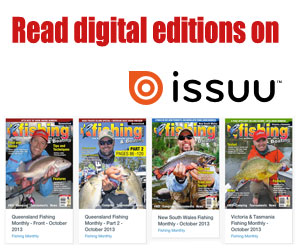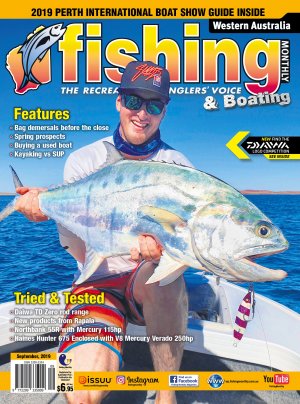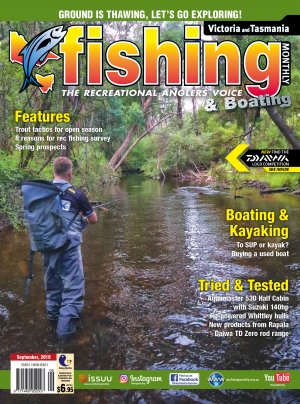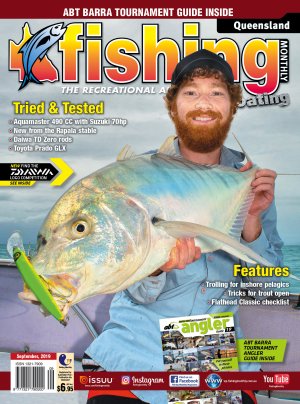AFTER a very shaky start the wet season finally arrived in early February. It dumped over a metre of rain by the end of the month, about three quarters of the annual rainfall in the Weipa area. The rivers are all running a banker, the swamps are overflowing and mould is rampant – all indicators of the best wet this part of the Cape has seen for three long years.
This can only mean great things for the coming fishing season and I reckon 2004 will be a BIG one! April is the month when the fishing really hots up so by the time you read this the action will be well and truly underway.
The wet season run-off period generally commences once the heavy rain starts to ease, usually in late March or early April, and continues into early July with the peak usually coming sometime in May. Each year is different; the amount of rain and when it falls combine to form a complex equation that varies the best of the best period from season to season.
2002 and 2003 saw run-offs in the Cape region that were almost a non-event, with other reports indicating similar experiences right throughout northern Australia. Already there are good signs that the run-off this year will be back to ‘normal’ with the abundant freshwater already creating excellent conditions for hatching large numbers of jelly prawns.
These minute prawns, less than a couple of centimetres long, seem to need an influx of freshwater to hatch and in the right conditions can form large reddish clouds along the river edges and beaches. These dense schools provide food for a wide range of marine species, from juvenile barramundi and grunter right through to massive manta rays.
Jelly prawns are a major food source on the western Cape with numbers generally peaking at about the same time as the run-off fishing goes ballistic. A big wet ensures that there are plenty of jelly prawns and consequently plenty of those fish anglers like to catch, like barra and threadies.
Josh Lyon and I have already had a couple of very hectic flyfishing sessions in the company of massed baitfish and jelly prawn schools. One morning we fished ourselves to a standstill on queenfish, dart, golden and big-eye trevally while fishing off the beach at the entrance to a local estuary.
The fish were taking our Clousers while they were sinking in the strong current before we even started to strip. Fish continually smashed the bait schools, coming almost to our feet at times.
While baitfish schools are already showing up in good numbers offshore, these should increase and consolidate during the run-off period, usually reaching a peak in mid to late May. Weipa becomes an offshore ‘heaven’ from April to July with longtails, trevally, queenfish, mackerel, cobia and small marlin rounding up the massive bait schools, usually in the company of plenty of small to huge sharks.
It’s a time of year every angler should aim to experience at least once in their lifetime. Just make sure you bring plenty of lures when you decide to make the trip!
I’ve often mentioned my belief in the theory that taking bananas on your boat will mean you don’t catch any fish, so much so that I absolutely refuse to allow any of the dreaded yellow fruit to ever come aboard. But does the banana ‘curse’ extend to other forms of boating activities? Well, a recent experience provides some very convincing evidence that it does!
In the past couple of years, I’ve been working closely with Dr Bryan Fry of the Australian Venom Research Unit based at the Melbourne Aquarium, catching sea snakes for his landmark investigations into sea snake antivenom and the evolution of that venom. Part of the process has included working with a number of television film crews from the USA, UK, Germany and, of course, locally.
During a recent visit by Nigel Marvin, a famous wildlife documentary maker from the UK, I spotted a hand of bananas in the tucker box being loaded along with the camera cases and dry bags. I mentioned the fact that I didn’t like bananas on my boat when fishing but wasn’t too concerned when my comments were laughed off.
Up the river, we waited for darkness to fall as we rigged the spotlights and readied the landing nets. The first snake was spotted just as the last fingers of light left the waters surface and the cameraman readied the betacam to record the capture.
The camera refused to start and, despite frantic efforts by the operator, could not be coaxed into exposing videotape for the entire time we sent on the water that evening. We caught plenty of snakes but none had their images recorded.
Next day, the camera still refused to work so a replacement was sourced and flown at great expense to Weipa for the now significantly reduced filming opportunity. That night, sans any bananas, the sea snake saga was successfully completed by early morning.
I’ll bet the Poms on that film crew will be very careful where they take bananas in the future. In my own case, bananas stay off my boat forever, regardless of the purpose of any expedition!
Following up on my March column about the icebergs threatening recreational fishing as we know it, I’ve since discovered that a couple of other fishers have been thinking along similar lines. Articles by Kevin Collins and Don Porter have appeared in another publication calling for anglers to work together to counteract the restrictions currently mooted.
One conclusion that both Kevin and I reached independently was that right now is the best opportunity recreational anglers in Queensland have ever had to get a representative into politics. We both believe that the senate election, to be held later this year, is the obvious political avenue to target, given the structure of our election process.
There are some legal requirements to field a senate candidate and these are currently being investigated. A political party may have to be formed with a requisite number of members to meet the necessary criteria.
A senate position would certainly offer a fantastic opportunity to raise the profile of recreational fishing, particularly when critical bills are being debated. The bargaining opportunities these situations offer, if used judiciously, could benefit our sport immensely.
Such a bold move would need the wholesale support of our states’ angling and boating community. Queensland anglers may, at last, have the chance to stand up and be counted (literally) in the political arena.
Look out for more news in the next QFM.
1) Allan de Saram with one species that feeds on the Gulf’s jelly prawn schools during the run-off – golden trevally.
2) Big Spanish mackerel like this one will be working offshore bait schools in the Gulf this month.
Reads: 984



